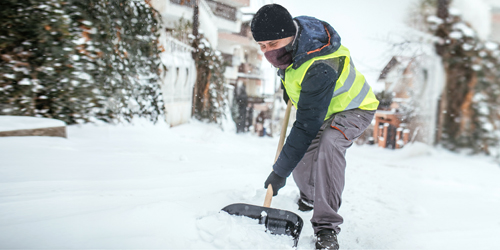
By David Stover, ATC, PTA
Winter has finally arrived in the heartland, and with it the responsibility for homeowners to shovel their walks and driveways.
Snow shoveling is a strenuous, aerobic activity that can place unusual stress on the muscles – including your heart muscle — and the spine. In fact, orthopedic injuries and cardiac events caused by snow shoveling result in 11,000 hospital visits each year. If you have heart disease or an ongoing spine problem, I strongly encourage you to outsource this task to a healthy family member, friend, or neighbor.
For those who are physically ready and able to tackle the snow, here are a few reminders on what to do before and after you start shoveling.
• Dress appropriately- Make sure your extremities and face are protected from the cold. Wearing a scarf or face mask will ensure that you breathe in warm air and will help prevent your heart and lungs from working too hard.
• Warm up by stretching before you go outside to shovel. If you forget to stretch, start slowly and build up to heavy shovel lifting.
• Use the right tools. Choose a snow shovel that is the right weight for you.
• Use proper mechanics. Push the snow if you can. If you can’t push the snow, lift smaller amounts while bending the knees and keeping your back straight. Avoid twisting if possible.
• Be aware of your body. Take breaks and avoid pushing yourself to the limit. Shoveling, which can involve moving hundreds of pounds of snow, is a well-known trigger of cardiac events. If you feel pain in your chest, left arm, or jaw, call 9-1-1.
• Get ahead of the snow by spreading a deicer or gravel on walkways and driveways before the snow hits. If there are breaks in the snowfall, shovel multiple times during the day instead of waiting until the snow has completely stopped.
• Stay hydrated!
• Take time to do proper stretching after you shovel.
If you are not accustomed to working out, shoveling snow may cause a delayed onset of muscle soreness. This “workout pain” can occur hours or even days after shoveling. If the pain is so severe that it limits your movement and lasts longer than a couple of weeks, seek advice from your health care provider.
David Stover, ATC, PTA, is a physical therapy assistant at Mayfield Brain & Spine.